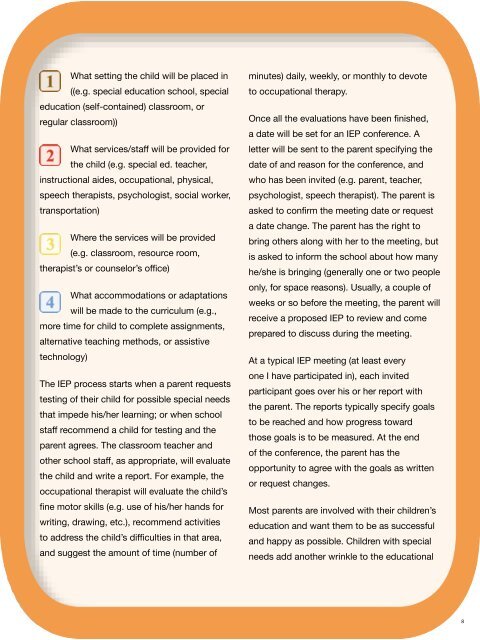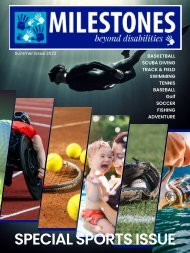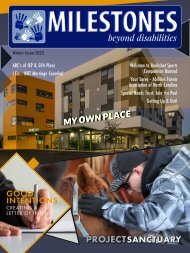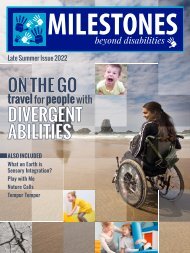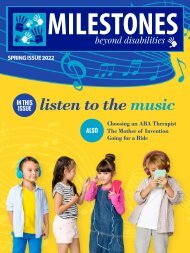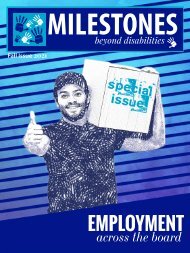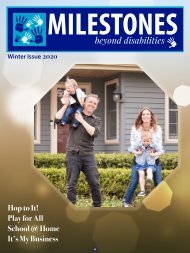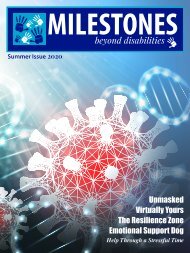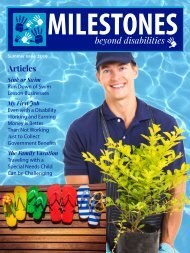Milestones Magazine Fall Issue
Milestones Magazine was developed to help individuals with disabilities and their families achieve and celebrate events and milestones in their lives.
Milestones Magazine was developed to help individuals with disabilities and their families achieve and celebrate events and milestones in their lives.
You also want an ePaper? Increase the reach of your titles
YUMPU automatically turns print PDFs into web optimized ePapers that Google loves.
What setting the child will be placed in<br />
((e.g. special education school, special<br />
minutes) daily, weekly, or monthly to devote<br />
to occupational therapy.<br />
education (self-contained) classroom, or<br />
regular classroom))<br />
Once all the evaluations have been finished,<br />
a date will be set for an IEP conference. A<br />
What services/staff will be provided for<br />
the child (e.g. special ed. teacher,<br />
instructional aides, occupational, physical,<br />
speech therapists, psychologist, social worker,<br />
transportation)<br />
letter will be sent to the parent specifying the<br />
date of and reason for the conference, and<br />
who has been invited (e.g. parent, teacher,<br />
psychologist, speech therapist). The parent is<br />
asked to confirm the meeting date or request<br />
a date change. The parent has the right to<br />
Where the services will be provided<br />
(e.g. classroom, resource room,<br />
therapist’s or counselor’s office)<br />
bring others along with her to the meeting, but<br />
is asked to inform the school about how many<br />
he/she is bringing (generally one or two people<br />
only, for space reasons). Usually, a couple of<br />
What accommodations or adaptations<br />
will be made to the curriculum (e.g.,<br />
more time for child to complete assignments,<br />
weeks or so before the meeting, the parent will<br />
receive a proposed IEP to review and come<br />
prepared to discuss during the meeting.<br />
alternative teaching methods, or assistive<br />
technology)<br />
At a typical IEP meeting (at least every<br />
one I have participated in), each invited<br />
The IEP process starts when a parent requests<br />
testing of their child for possible special needs<br />
that impede his/her learning; or when school<br />
staff recommend a child for testing and the<br />
parent agrees. The classroom teacher and<br />
other school staff, as appropriate, will evaluate<br />
the child and write a report. For example, the<br />
participant goes over his or her report with<br />
the parent. The reports typically specify goals<br />
to be reached and how progress toward<br />
those goals is to be measured. At the end<br />
of the conference, the parent has the<br />
opportunity to agree with the goals as written<br />
or request changes.<br />
occupational therapist will evaluate the child’s<br />
fine motor skills (e.g. use of his/her hands for<br />
writing, drawing, etc.), recommend activities<br />
to address the child’s difficulties in that area,<br />
and suggest the amount of time (number of<br />
Most parents are involved with their children’s<br />
education and want them to be as successful<br />
and happy as possible. Children with special<br />
needs add another wrinkle to the educational<br />
8


